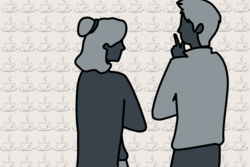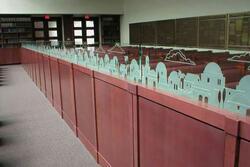A Conversation on the Future of Jewish Feminism
In my neighborhood we have a Reform synagogue, a Conservative synagogue, and a small Chabad house. My family belongs to, and has always been affiliated with, the Conservative synagogue. Aligning with my family’s values, on the spectrum of “conservative-ness,” my synagogue nears the left end of the progressive side. In that community and mixed with my Hebrew school experience (where we were encouraged to uniquely interpret Torah texts from a young age), I never felt limited in my exploration of Judaism. However, not everyone was offered that same experience, and I wanted to learn more about why.
Since I was an infant, my neighbors have been like family. Our families have a combined six kids, ages now ranging from 17-24. I am the youngest, so functionally I have 5 older siblings. We spend every Shabbat dinner together—and often Saturday night, too. Despite our closeness, their family’s affiliation was always with Chabad. The kids stayed in a Jewish private school through eighth grade while my brother and I left that school for secular education earlier. Yet, our joint family dinners never ceased. I noticed, however, that as we all grew up, the girls in their family distanced themselves from Chabad.
Recently, I sat down with two of the girls in their family, Isabel, age 20, and Gabrielle, age 24, and we talked candidly about our experiences with Jewish feminism. I realized that in our seventeen years of knowing each other, with hundreds of Shabbat dinners and meals along with other conjoined family excursions, I can count on one hand the number of times we’ve talked about our places as women in Judaism. Jewish feminism, though not necessarily taboo, is a particular niche of conversation that is usually brought up deliberately.
When I introduced this topic of “The Future of Jewish Feminism,” Isabel almost immediately asserted (half-jokingly) that, “either the Jews have to learn feminism or the feminists will leave Judaism.” Right away, I knew that this conversation would be powerful. Her comment made me realize my own biases. I’ve had the privilege of experiencing many instances of feminism in my Jewish upbringing. I voiced my loud feminist thoughts weekly at Hebrew school, led the Torah service at my Bat Mitzvah, and even joined a feminist writing fellowship, so from my vantage point, feminism intersects constantly and comfortably with Judaism. But for Isabel, who grew up surrounded by Chabad and in a Jewish day school, feminism was lacking. Interpreting her statement as both a cry for help and an ultimatum, I see the future of Jewish feminism as needing to encompass both possibilities.
First, let’s explore Isabel’s statement as a cry for help: Many present-day Jewish institutions are such that women have an extremely difficult time making their voices heard, especially in more religious spaces. In places like Chabad, where men and women are separated by a mechitzah, it is hard to feel like you belong. Gabrielle said that, “when [she goes] to Orthodox services, [she feels] like just a body—not a full human.” And Isabel agreed, adding that she “wouldn’t count towards a minyan” and that takes away from the welcoming nature that one would hope to find in their place of worship and observance. Typically, since stricter denominations of Judaism are not accepting of men and women as equals, leadership roles filled by women are scarce. And although more progressive movements like Reform or Reconstructionist Judaism are welcoming to women, not all women identify with that type of prayer practice.
After all, the spiritual aspect of Judaism is fulfilling to different people in drastically different ways. Isabel expressed that it is integral to “find a way to maintain Orthodoxy but also modernize some of the laws to make it welcoming.” She believes that “Jewish women stepping into roles of Jewish leadership shouldn’t mean the level of religiousness is watered down.” The idea of “watered down Judaism'' is subjective, though it is important to take into account that, to some, Jewish content may feel watered down in places where "women belong" because they don't belong elsewhere. Intense religious practice is often deemed unladylike and therefore it is left to the men who might be praised as scholarly for their dedication. However, women also want to engage in deep prayer and text study that does not feel “watered down.” This religious autonomy feels unattainable.
On a different note, this is what I came up with when exploring Isabel’s initial words of advice as an ultimatum: All in all, women are tired. Examples of indirect and direct parts of Jewish practice that are meant to put down women are everywhere. In my Jewish day school, during our morning prayers, I grew up listening to all the boys praising God “who has not made me a woman” while we girls were instructed to recite an alternative, blessing God “who has created me according to his will.” We began this practice in first grade. Jewish day school instilled in me every morning from the age of six that I, a woman, got the short end of the stick, but at least “that’s how God wanted it.” I remember being bewildered upon learning the translation and astonished at the normalcy with which it was accepted.
Engaging in religious practice should not be circumscribed by demeaning patriarchal structures. How can we ensure that women have the Jewish resources they specifically want and need while still receiving respect from their community? Among those religious practices, there are also the societal burdens placed on women through Judaism. For example, the household chores are almost entirely placed on the woman in Orthodoxy. Isabel said that “changing the attitude of ‘putting women on a pedestal for doing housework’ to excuse the fact that [men] don’t do any housework” needs to be addressed. Gabrielle emphasized that the future “needs to involve a rethinking of modesty cultures and the ways that they oppress women.” These two examples of the ways that women are placed in a premade box full of their duties and expectations illustrate exactly why many women feel stuck or stunted. To my friends, a path already seems paved and deviation might feel like a betrayal to their community. And to some, the deviation is worth it, but to others their community supersedes it. Women should not have to pick between their chosen religious practices or respect from those around them.
And so, as Isabel said, “either the Jews have to learn feminism or the feminists will leave Judaism.” Her statement will stick with me and I hope it will have the same impact for others. My Judaism is about learning feminism and encouraging it around me. My Judaism is about involving myself in Jewish spaces that enable, support, and even inspire feminism. My Judaism is about advocating for others to be able to use their voices to find their Judaism. Our Judaism is about changing the systems that hold others back from practicing the meaningful rituals that contribute to their Judaism.
This piece was written as part of JWA’s Rising Voices Fellowship.







